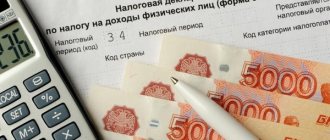What is a penalty?
Penalty – this is the amount of money paid by the debtor to the creditor in the event of violation or improper fulfillment of obligations under the contract (clause 1 of Article 329; clause 1 of Article 330 of the Civil Code of the Russian Federation). Collection of penalties is based on non-fulfillment of civil obligations (or their improper fulfillment) and is liability for violation of obligations under the contract. Penalties are not related to payment made in accordance with Article 162 of the Tax Code of the Russian Federation, and are not subject to VAT (Resolution of the Presidium of the Supreme Arbitration Court of the Russian Federation dated 02/05/2008 No. 11144/07, FAS Moscow District dated 04/25/2012 No. F05-3330/12 on the case No. A40-71490/2011, dated 12/01/2011 No. F05-12728/11, dated 03/11/2009 No. KA-A40/1255-09).
Sample payment order for VAT payment
In case of failure to pay the obligation on time, the defaulter will have to calculate a penalty, which must subsequently be included in the budget. When filling out a payment form, it is important to pay attention to the details that are related to VAT.
That is, in the order you must indicate the status of the payer, your details, as well as the recipient. The recipient will be the Federal Tax Service, where the person is registered. The type of transaction, the order of payment, the payment identifier, the OKTMO field, the KBK field, the basis for the payment, the tax period, the date of signing the declaration in which the tax was calculated should be displayed.
In the payment order for the penalty, if the person has calculated it and is paying it independently, it is necessary to display the BCC for it, the basis for the payment, and indicate in the purpose of the payment that payment is being made under sanctions. If payment is made on demand, then the basis for payment will be repayment of the debt at the request of the Federal Tax Service.
Is VAT charged on penalties for the taxpayer-seller?
If the amount of the penalty received by the seller from the buyer is one of the elements of forming the price of the contract, then when forming the tax base for VAT, tax inspectors will take this amount into account (Article 162 of the Tax Code of the Russian Federation, letter of the Ministry of Finance of the Russian Federation 08/19/2013 No. 3-07-11 /33756). If the penalty is not included in the formation of the contract price, but is a liability for violating the terms of fulfillment of obligations to pay for goods, then the tax authorities must act on the basis of the provisions of the Resolution of the Presidium of the Supreme Arbitration Court of the Russian Federation dated 02/05/2008 No. 11144/07, and VAT is not charged on the penalty.
Calculation of penalties using an online calculator
The actual question is how to calculate VAT penalties. To do this, you can use an online calculator, or calculate penalties using special formulas. To use the calculator, you need to select which tax should be calculated, select the payment date that was set, and the date of actual payment.
To calculate the formula, you need to multiply the following values:
- The amount of the contribution not paid on time.
- Refinancing rate/300.
- Number of days payment is delayed.
This formula is relevant if the delay is less than thirty days. Starting from 31 days, the contribution amount must be multiplied by the refinancing rate divided by 150. The resulting value is multiplied by the number of days of delay. Thus, the longer the overdue debt is not paid, the greater the size of the sanctions will be.
Is VAT charged on penalties for the taxpayer-buyer?
The amounts of penalties received by the taxpayer-buyer under the agreement are not taken into account when calculating the tax base for VAT. This applies to penalties for violation of deadlines for the completion of work, provision of services or delivery of goods, for improper performance of work or violation of discipline in the performance of work. The provisions of paragraph 2 of Article 153 and paragraph 2 of paragraph 1 of Article 162 of the Tax Code of the Russian Federation do not apply to the taxpayer-buyer (letter of the Ministry of Finance of the Russian Federation dated April 12, 2013 No. 03-07-11/12363, letter of the Federal Tax Service of Russia dated August 9, 2011 No. AS-4-3/ [email protected] , letter of the Federal Tax Service of Russia for Moscow dated 02/07/2008 No. 19-11/11309, resolution of the Federal Antimonopoly Service of the Ural District dated 11/07/2007 No. Ф09-9025/07-С2). Thus, VAT is not charged on the amount of the penalty received by the seller from the buyer if this amount is an element of pricing under the contract, and is charged if the penalty is not one of the elements of pricing. For the taxpayer-buyer, VAT is not charged on the amount of the penalty.
Results
From the latest explanations from officials it follows that received fines and penalties are not subject to VAT if they are not essentially an element of pricing - a hidden form of payment. Arbitrators generally share this view.
At what point should fines awarded by the court be taken into account for the purposes of calculating income tax, read the article “The Ministry of Finance said to take penalties into account in a new way.”
You can find more complete information on the topic in ConsultantPlus. Free trial access to the system for 2 days.
When VAT is charged on the principal amount
According to tax legislation, VAT is charged on amounts of money related to payment for goods, services or work performed by the taxpayer. These amounts also include amounts received by the taxpayer from the buyer by court decision for non-compliance with obligations under the contract in the form of interest for the use of other people's funds (Letter of the Department of Tax and Customs Tariff Policy of the Ministry of Finance of the Russian Federation dated September 11, 2009 N 03-07-11 /222 “On the taxation of VAT on amounts of money received by the taxpayer from buyers of goods (work, services) on the basis of an arbitration court decision for violation of contractual obligations in the form of interest for the use of someone else’s money”).
Documents acknowledging debt
Documents that indicate the debtor’s recognition of the obligation to pay fines, penalties, penalties under the contract may be:
- an agreement providing for the payment of sanctions;
- a bilateral act signed by the parties (agreement on termination of the contract, reconciliation act, etc.);
- a letter of agreement to pay sanctions to the counterparty (in full or in a smaller amount based on the terms of the concluded agreement), confirming the fact of violation of the terms of the agreement and allowing to determine the amount of the recognized amount.
An agreement concluded with a counterparty may:
- provide that sanctions are assessed only after the debtor is presented with a claim;
- do not provide for the obligation of the creditor company to file a claim.
In the first case, the creditor will reflect the sanctions in tax accounting only after filing a claim with the debtor.
In the second, when the partner violates his obligations and, according to the contract, the seller is due and must be accrued appropriate sanctions.
How much should the penalty be calculated: with VAT or without VAT?
According to Resolution of the Presidium No. 5451/09, the penalty is charged on the entire amount of the debt, including VAT. This decision had two reasons: a). VAT, highlighted in the price, is not actually a tax, but part of the price; b). companies pay VAT on shipment, i.e. the lender must reflect input VAT at the time the goods are shipped and the invoice is issued, and not at the time the funds are actually received; Thus, VAT is paid to the budget from the creditor’s funds, and failure to pay the debt on time leads to the inability to cover this expense in a timely manner. This means that the creditor has a civil interest in repaying the entire amount of the debt, including VAT, as soon as possible. In the Resolution of the Presidium of the Supreme Arbitration Court of the Russian Federation No. 5382/12, a different decision was made (the penalty was to be calculated on the amount of the debt without VAT). Despite the fact that the lower courts were guided by Resolution No. 5451/09 when making their decision, the Supreme Arbitration Court did not accept their arguments, justifying its decision with the following arguments: a). in the case at hand there was a violation of transportation obligations, not financial obligations; b). Since we are talking about railway transportation, which has special regulation, the payment for transportation, for which, in accordance with the contract, penalties must be charged, is expressed in the form of a tariff that does not include VAT. Therefore, VAT in this case is not an element of the price, but is added to it. This precedent is not applied in judicial practice, therefore, when deciding to charge a penalty on the amount of the debt, one should be guided by Resolution No. 5451/09 and charge a penalty on the entire amount of the debt, including VAT. Representation in the Arbitration Court
Individual entrepreneur fine for failure to submit reports and non-payment of taxes in 2021
The activities of individual entrepreneurs are regulated by tax, administrative and criminal codes, which provide for various types of penalties, the nature and amount of which depend on the type and degree of violation.
- Late submission of tax reports entails a fine of 5% of the unpaid amount of tax that would have been payable according to the data of this declaration, for each full or partial month from the day established for its submission. The amount of the fine cannot be less than 1000 rubles, but not more than 30% of the specified amount.
In addition to imposing penalties, representatives of tax authorities can suspend all expenditure transactions on individual entrepreneurs’ accounts, except for payments that, in accordance with the law, have a higher priority than tax ones. This right is provided for in Article 76 of the Tax Code of the Russian Federation and is available for use if the deadline for filing a declaration is missed by more than 10 days. The arrest is lifted the next day after the declaration is submitted.
- Distortion of tax reporting data or violation of the rules for accounting for income, expenses and other taxable items.
- Tax liability. If deficiencies are discovered in tax accounting, for example, the absence of primary documents, a fine of 10,000 rubles is imposed. (Article 120 Tax Code). If this violation occurs in several tax periods (more than one), then the amount of the fine increases to 30,000 rubles. If facts of underestimation of the tax base are revealed, the fine may be 20% of the unpaid tax amount, but not less than 40,000 rubles.
Please note that paying a fine does not exempt you from paying the tax itself and penalties for late payments.
- Criminal liability. For falsification of primary documents and entering deliberately false data into the declaration, which leads to an understatement of tax on an especially large scale (more than 300,000 rubles), a fine of up to 300,000 rubles is provided. or in the amount of the convicted person’s income for a period of up to 2 years, or imprisonment for up to 1 year (Article 198 of the Criminal Code of the Russian Federation). If the amount of damage exceeds 1,500,000 rubles, then the fine increases to 500,000 rubles. or in the amount of income for a period of up to 3 years, or imprisonment for up to 3 years.
- Penalty for late payment of taxes
- Tax liability. If the tax fee is not paid on time, tax service representatives will send a request to the taxpayer to pay the missing amount with penalties already accrued (Article 69 of the Tax Code). A penalty is charged for each day of delay in the amount of 1/300 of the refinancing rate (in 2021 the refinancing rate is 10%). If the amount of the specified arrears is not paid on time, then the tax is forcibly withdrawn (Article 46 of the Tax Code). In addition, a fine of 20% of the unpaid amount is imposed, and if an intent to understate is revealed, the amount of the fine may increase to 40%.
- Criminal liability. If the fact of concealing funds or property from tax collection is revealed, the amount of the fine may increase to 500,000 rubles. or in the amount of the convicted person’s income for a period of up to 3 years, or imprisonment for up to 5 years.
Fines are subject to VAT: as before
Initially, the financial department was inclined to believe that fines were subject to VAT. This opinion was justified as follows: fines were equated to amounts received as payment for goods, and according to the provisions of the Tax Code of the Russian Federation, such receipts should be subject to VAT.
The officials did not offer any other explanations, considering their point of view to be fair, but at the same time, there was not a single decision in judicial practice in which the courts supported the above conclusion.








